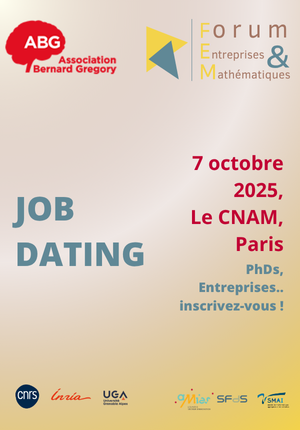Photoexcitation Dynamics in Dielectrics Irradiated by Ultrafast Laser Pulses
| ABG-132961 | Thesis topic | |
| 2025-07-18 | Public funding alone (i.e. government, region, European, international organization research grant) |
- Physics
- Physics
- Engineering sciences
Topic description
This PhD project is embedded within the broader scope of the FLASH project, which aims to predict and model structural transformations in dielectric materials irradiated by bursts of ultrafast laser pulses, with durations ranging from femtoseconds to several nanoseconds. The work focuses on two major challenges in the physics of ultrafast laser-matter interaction: (1) understanding the nonlinear absorption dynamics governed by photoexcited states, and (2) modeling the inhomogeneous thermal relaxation in porous and heterogeneous media.
To address these challenges, the candidate will contribute to the development of a quantum-mechanical model for nonlinear light absorption based on Maxwell-Bloch Equations (MBE), combined with ab initio calculations of band structures and transition dipole moments using DFT codes (Abinit, VASP, Octopus, SALMON). The materials of interest are functional dielectrics, such as fused silica (SiO₂), alumina (Al₂O₃), and zirconia (ZrO₂), relevant for emerging 3D photonic technologies.
The project will provide both theoretical insight and numerical tools for predicting the optical and structural evolution of photoexcited dielectrics and for benchmarking these models against ultrafast time-resolved experiments carried out at national LUMA platforms.
Scientific Objectives:
The PhD research will focus on the following main objectives:
- Modeling photoexcitation dynamics in key dielectric materials using a quantum approach (MBE) informed by high-resolution band structure and dipole moment data.
- Developing a database of optical properties (e.g., refractive index, nonlinear susceptibilities) for selected materials in both ground and photoexcited states.
- Validating theoretical predictions through comparison with time-resolved spectroscopy and imaging experiments conducted within the Ultrafast LUMA infrastructure.
- Investigating the coupling of electronic excitation and structural effects, including bandgap renormalization and transient polymorphism in irradiated porous dielectrics.
Starting date
Funding category
Funding further details
Presentation of host institution and host laboratory
The Hubert Curien laboratory is a joint research unit (UMR 5516) of the Jean Monnet University, Saint-Etienne, the National Research Center ”CNRS” and the Institut d’Optique Graduate School. It is composed of about 240 staff which makes the lab the most important research structure of Saint- Etienne. The research activities are organized according to two scientific departments: Optics, photonics and surfaces and Computer Science, Security, Image. The research activity is structured into scientific projects within 6 main teams: Micro/Nano structuring, Materials for Optics and Photonics in Extreme Radiative Environments, Laser-matter Interaction, Image Science & computer vision, Data Intelligence and Secure Embedded Systems & Hardware Architectures.
Website :
PhD title
Country where you obtained your PhD
Institution awarding doctoral degree
Graduate school
Candidate's profile
The ideal candidate holds a Master's degree (MSc or equivalent) in Physics, Photonics, Materials Science, or related fields. The following skills and background are expected:
Strong knowledge in quantum mechanics, solid-state physics, and optical properties of materials
Experience with numerical modeling (Python, Julia, C++) and DFT codes (VASP, Abinit, Octopus) are welcome
Familiarity with ultrafast optics or laser-matter interactions is a plus
Motivated to work in a collaborative, multidisciplinary, and experimental-theoretical environment
Vous avez déjà un compte ?
Nouvel utilisateur ?
Get ABG’s monthly newsletters including news, job offers, grants & fellowships and a selection of relevant events…
Discover our members
 PhDOOC
PhDOOC  ONERA - The French Aerospace Lab
ONERA - The French Aerospace Lab  MabDesign
MabDesign  Nokia Bell Labs France
Nokia Bell Labs France  Aérocentre, Pôle d'excellence régional
Aérocentre, Pôle d'excellence régional  Ifremer
Ifremer  SUEZ
SUEZ  TotalEnergies
TotalEnergies  Laboratoire National de Métrologie et d'Essais - LNE
Laboratoire National de Métrologie et d'Essais - LNE  Tecknowmetrix
Tecknowmetrix  CESI
CESI  ASNR - Autorité de sûreté nucléaire et de radioprotection - Siège
ASNR - Autorité de sûreté nucléaire et de radioprotection - Siège  Institut Sup'biotech de Paris
Institut Sup'biotech de Paris  MabDesign
MabDesign  ANRT
ANRT  Groupe AFNOR - Association française de normalisation
Groupe AFNOR - Association française de normalisation  CASDEN
CASDEN  ADEME
ADEME  Généthon
Généthon


